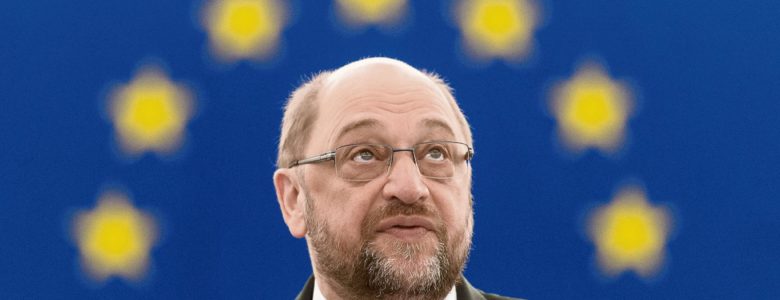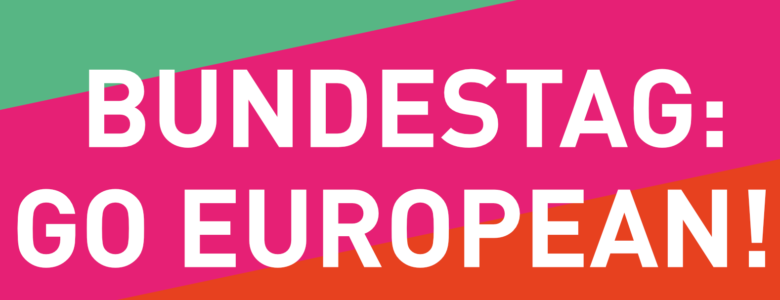
Suddenly “United States of Europe” seems not so utopian
Martin Schulz’s political maneuvers in the last couple of months have been successful. From a record-low performance, he is gaining momentum across progressives throughout Europe. In his speech, he outlined his vision for a united Europe. Very interestingly, his time frame looked familiar: 2025.
We are not sure whether Schulz has read our proposals on the European New Deal or heard our calls for action. But it is a positive surprise for us to hear that the second strongest political party in Germany is in line with our vision. However, as Yanis Varoufakis has recently highlighted, “Schulz’s sudden burst of Europeanism is intended as a tactical move to bring the SPD into another arid coalition with Angela Merkel – whose first move will be to kill off all aspirations to European federalism.”
So let us be precise: not just any old United States of Europe will work. The foundations should be firm and progressive: people-centric and not establishment-centric. Alongside our own campaign for transparency, voices calling for much-needed reforms in the European Parliament and for a vital rebuild of the Eurogroup must be given a hearing. The most crucial factor of all is our movement’s name: Democracy. We believe our proposed policies could secure this at last and would like to see them implemented. Join us, talk with us and let’s take action together!
Aris is a member and volunteer of the DiEM25 movement.

Vote now for your preferred candidates for our National Collectives!
Over the past few weeks, DiEMers across Europe have been submitting their candidacies for our first set of National Collectives — the groups that will coordinate our movement’s national efforts, including helping to organise elections there we might compete in — for Germany, Italy, Greece and Belgium.
Now, DiEM25 members, it’s time to vote them in! Any DiEM25 member can vote. So, visit our members area and social media channels, familiarise yourselves with the candidates, and give them the support they deserve.

LEAKED: Commission Trying to Woo German Conservatives by Sacrificing Europe to Austerity
Scarcely a week after the European Council turned its back on the democratic will of Europe’s citizens, we have been greeted by another ominous move that at once confirms our fears about the authoritarian direction the EU has adopted, while strengthening our resolve not to allow it to destroy the European project.
A document leaked by the French newspaper Libération has revealed that Commission President Jean-Claude Juncker has attempted to appease the most conservative of German politicians by offering draconian Eurozone reforms. These, in summary, would amount to the entire single-currency area being subjected to the same model that Greece has been labouring under since its first memorandum with the Troika. This confirms our warnings that Greece has been used as an ‘austerity laboratory’ to test and generate methods to be exported to the rest of the Eurozone. Juncker’s proposal includes:
- Rejecting Macron’s “eurozone budget” and opting instead for a “budget line” which, being part of the EU budget, would be dependent on an agreement by all 27 members, 8 of which do not have the Euro and would not be keen to share their money with those who do. This budget would not be permanent either, but would take the form of aid, shared in the event of a serious economic crisis, and only in return for structural reforms (essentially austerity measures)
- The “balanced budget” is made a fundamental principle of European law, limiting the “structural deficit” of Member States’ budgets at 0.5% of their GDP. This would make a reality the “Troika in Paris” scenario, Wolfgang Schäuble’s long-term plan and the reason why Greece was transformed into a neoliberal experiment
- The European Stability Mechanism (ESM) would be transformed into a European Monetary Fund (EMF), with the ability not only to impose austerity programs, but also to restructure (cancel, extend repayment periods, lower interest rates) public debts. Its operation would remain governed by the rule of unanimity of the States that compose it
- The European parliament would be granted a consultative role in the nomination of the head of the EMF and could interrogate her or him behind closed doors, but would have no power over whether the above proposals are implemented. Power will remain, as always, with national governments
The European Commission is driving us further and further away from a united Europe of solidarity and prosperity, and closer to a dystopian alternative of economic asphyxiation, driven by an economic dogma that is proven not only to be ineffective, but highly destructive to both economies and societies.
With the chances of a CDU-FDP coalition looking increasingly unlikely, perhaps the above proposal will never be officially tabled. However, these leaked documents act as a stark reminder of the power balance in Europe and the lengths to which the Commission President seems willing to go to appease his Conservative political family. The lack of democratic accountability over such machinations should worry us all.
Join DiEM25 and demand your democratic rights over an EU worth preserving!
Erik is DiEM25’s Internal Communications Coordinator.

Hey German parliament, help democratise Europe!
The local DiEM25 group in Berlin (DSC Berlin 1) has launched a vital new campaign with other pro-European organisations. Called “Bundestag: Go European”, the campaign calls on the new German parliament to use its influence on European politics to strengthen European democracy. It outlines 13 concrete demands that the parliament should act on, including live streaming of all Council meetings.
Check out the video below for more:
What can you do?
- Sign the petition (the button to press is “Petition mitzeichnen”) to send a clear message to German MPs: The time for a citizens’ Europe is now!
- Support the Thunderclap on Twitter or Facebook, to spread the message
- Join DiEM25 to get hands-on with this campaign or others.
For more information on this campaign, visit its website.
Guys, let’s shake the Bundestag together. Gently, compassionately… but firmly!

A Tale of Two Faltering Unions (UK and EU); and what DiEM25 proposes in response
The transcript of my talk was kindly prepared by Rosemary Blecher for openDemocracy.net, where it was first published. Thanks are also due to Anthony Barnett, whose splendid book THE LURE OF GREATNESS: England’s Brexit and America’s Trump influenced my thinking.
Good evening everyone. Thank you so much to the Oxford Guild for inviting me. Allow me to begin with something that I could have written, but didn’t. I’ll just read it out:
“I am such a passionate believer in Europe that I accept the accusation of being a troublemaker. But I’m not awkward. I just want Europe to work!”
I didn’t say that: Margaret Thatcher said that in 1990. But I am very happy to endorse her sentiments. And the reason why I came up with this quotation is because walking into the building I was told “ This is the Margaret Thatcher Annexe. It won’t please you very much Mr.Varoufakis. But what can we do about it? ” My response was, “ The state of politics in this country and in Europe has deteriorated to such an extent that even though I spent my youth never missing a demonstration against Mrs. Thatcher, I have to say that I miss her!” Make what you wish of this.
Just for a moment let us go back to June 23, 2016 – the referendum. The thing that I lament the most about the referendum is that it was such a wasted opportunity to have a proper, frank and useful debate. Both sides of the argument infantilised the electorate and they made it impossible for such a conversation to take place. Both sides made profound, fundamental errors.
If you think about it, both treated the European Union as if it was a club, with Britain a member considering whether it is worthwhile renewing his or her membership. A club is a given, either the service it provides justifies the membership fee and all the trouble you have to go through in order to maintain your links with the club, or not. But that is not what the European Union is like. The European Union is a work in progress. And to be more precise, speaking of June, 2016, it is a disintegrating, frazzling at the edges, or fraying-at-the-edges union. But I’m afraid the same can be said about the United Kingdom. Thus the title I came up with as a summary of what I want to talk to you about tonight: a tale of two faltering unions, with Brexit on the one hand and the attitude of Brussels towards Britain on the other, as indications of the deep malaise both in Europe and in the United Kingdom.
Bretton Woods
Now, let’s start with the European Union. The great fallacy with the EU – at least within the dominant paradigms of the élites of Europe, of Germany, of France, continental Europe – is that the EU was a remarkable achievement of Europeans, European design and implementation. It was no such thing. It was an American design and an American implementation. Americans got French and German heads together – banged them – and said, “You are going to form a union, and we’re going to set the parameters for it as part of the Bretton Woods system”, the attempt to create a stable, global capitalist economy after 1944 – 5. By 1946, the New Dealers in power inside Washington DC decided that this global system that they were creating – think about it, it was extremely ambitious, right? – here you had a common currency area, not just of continental Europe, but also of Britain, the United States, of Japan and even India. That was what the Bretton Woods fixed exchange rates would achieve. With fixed exchange rates you have one currency area, the IMF managing the exchange rates and revising them when need be, and you had the United States, dollarizing Europe. That was the purpose of the fixed exchange rate. So it was a massively centrally-planned global economy. And it was the plan that gave rise to the golden era of capitalism: two decades of steady growth, minimal unemployment, minimal inflation and hugely shrinking inequality. It was what created the baby boomers, and what created the sense that capitalism had civilised itself.
But of course that system had collapsed by 1971 for a very simple reason. The pillar on which that system was sitting was American surpluses. America had exited the second world war as the only creditor nation, as the only surplus producer and really it was acting by recycling its surpluses to Europe and to Japan to prop up these parts of the global system that it had created. But by the late 1960’s the United States had no surpluses, and therefore, pragmatic Americans as they always are, they jettisoned the system that they had created. The result was the Nixon shock in 1971 and a brave new phase of post-war capitalism which was exactly the inverse of the Bretton Woods system.
The inverse of Bretton Woods
So what happened in the 1970’s going into the 1980’s was that the US was getting deeper and deeper into debt, with the twin deficits of the budget deficit and the trade deficit. And the trade deficit of the US was operating like a huge vacuum cleaner which was sucking into the territory of the US the net exports of Holland, of Japan, of Germany, and later of China – creating the demand for the gleaming factories in those countries, and who was paying for the deficit which was getting larger and larger? Very simple. German industrialists, Japanese industrialists, Chinese industrialists, who were recycling their surpluses, their profits through Wall Street, into the American economy, which was then of course closing the loop of aggregate demand.
Now of course the problem with this was that on the back of this tsunami of capital which was flowing into Wall St. every day – about $5 billion net a day for thirty years – well, what happens when you gives $5 billion a day to a banker? They do things with it. It is called financialisation. So, deregulation and derivatives and all that was a natural repercussion of this new-fangled global recycling mechanism.
Unfortunately, they did a little more of it than the planet could take, and just to give you two figures to bear in mind, in 2001, global GDP (forget the zero’s) was around 50. The total size of the derivatives was 70. By 2007 and the collapse, global GDP had gone from 50 to 70. And the derivatives had gone from 70 to 750. So of course they collapsed like all good bubbles or pyramids, or sandcastles do.
The tragedy is that after that collapse, the American economy could no longer stabilise aggregate demand in Europe, in China, or even in the United States. So you have this ongoing crisis.
The euro
From 1971 when Bretton Woods collapsed, the Europeans had tried to replenish the fixed exchange rate regime. That’s the beginning of the euro. The reason why Europe had to do this was because Europe was set up by the Americans as a cartel of heavy industry. Remember the first name of the European Union? The European Communities of Coal and Steel – a bit like OPEC. A cartel of coal and steel that then co-opted carmakers, then the French farmers, who had to be given a cut of the oligarpolistic profits of German, French, Dutch, North Italian industries in order to allow for free trade to take place – it is called the common agricultural policy by the way.
Then the banking community was co-opted as well, and then of course with financialisation, the banking sector became the driving force of the European Union.
Now of course we Europeans on the other side of the Channel would like to imagine that this was a fantastic European creation. And indeed there was always a triumphalism in continental Europe about this creation – with good cause because it was a magnificent and highly ambitious project, including for example the fact that you can travel all the way from Greece to France without stopping at borders, with the single market, with the Erasmus programme which I think is a really magnificent programme – the fact that we have had peace in Europe for 70 years given the bloodthirsty continent that we live on – these are all remarkable and genuine achievements.
But to think that this was a pan-European democracy, and that it was a European project designed and delivered by Europeans is a complete delusion of us continental Europeans.
So the point I am going to make, in relation to the United Kingdom or Britain, is that Britain was always going to be the odd man or woman out. Because British capitalism, from its beginnings in the industrial revolution, was never built along the lines of a cartel.
There was spontaneous order from the beginning. Industry, capital, capital accumulation occurred without a central design. It was not the result of a certain Bismarck who decided that he was going to industrialise his country. It emerged in a kind of Burkean or Humean or Adam Smithian spontaneous order. Blending together the state planned capitalism of continental Europe with the spontaneous capitalism of Britain was always going to be very difficult. And of course by the time that the European Union was being created, British capitalism was on its last legs, or it was fading very rapidly – with the state-planned capitalism model taking over globally (from Japan and the United States, under the central design of the military-industrial complex, to China, the EU etc.).
So at the very moment that the European Common Market launched, creating this fantasy in the élite minds of Europeans about how clever we Europeans are, Dean Ascheson, US Secretary of State in the 1950’s, early 1960’s, said that Britain had lost an empire, but had not found a role for itself. When Britain came into the Common Market, the predecessor of the European Union, in this country it was felt, more or less, as part of a historic defeat: whereas for the continental European élites, it was a triumph.
Euroskepticism
And that is to do with this fundamentally different structure of British capitalism vis-à-vis European Union capitalism. So let us be clear, there are good reasons for being eurosceptic in this country, but that does not necessarily mean that Brexit was a good idea.
I campaigned against it in this country and do not regret it even though we lost. But you know heroic defeats are becoming ‘my thing’! (Laughter.) I believe in this country, however, they can be appreciated. I remember from when I was living here back in the 80’s, Eddie the Eagle and other such failures, like… Nick Clegg, Ed – you know – there have always been a lot of heroic failures in this country! So maybe I too will have a sympathetic ear in this place!
Today, if you compare these two unions, the United Kingdom and the European Union, what you have is a very sad, pathetic vista on both sides of the English Channel. You have the EU, which is celebrating the overcoming of a crisis, the eurocrisis in particular, which is actually getting worse.
And you have a UK which is celebrating its newfound confidence by cutting off its nose to spite its face, through Brexit. Because let’s face it, the three circles of Winston Churchill that portrayed his ambition for a dominant Britain – the three circles being Europe, the NATO treaty or the Anglo-American connection and the Commonwealth – those three circles – have shifted so much that Britain can no longer pretend, if you want, to be at the centre of all three circles.
What now?
Forty years of membership of the European Union has allowed a particular development model, or economic model in Europe and in the United Kingdom to emerge, which, if you will allow me to be slightly vulgar about it, is nothing more than a rentier economy.
Ever since deindustrialisation was a choice by Margaret Thatcher in the 1980’s with the cultivation of financialisation, you have effectively had a country structurally in trade deficit to the rest of the world, which is being propped up by financial flows and by financialisation. When you cultivate that kind of economy for 40 years, you cannot suddenly cut it off from the European Union and pretend that you are going to rule the waves again to reconstitute the British Empire. I mean, you can pretend that, but it is pretty catastrophic for this country!!
At the same time, you have a European Union that is so grossly unappealing, because it is failing in its duty to itself to recognise the systemic crisis that it has entered into ever since the financial crisis of 2008 exposed the fragility of its monetary and all but absent fiscal institutions, that it is impossible in this country, in the context of a referendum like that of June 2016, to make the argument that we need passionately to support the European Union and to remain in the European Union because it is the best thing since sliced bread.
So when I was appearing in various audiences up and down the country, in England and Wales and Scotland and even in Northern Ireland, my line was very simple: “The European Union sucks, and you have to stay in it!” – which is not a very easy sell you know! But it was the truth. I remember when Jeremy Corbyn was asked – I don’t remember by which journalist on television, between 1 and 10 how enthusiastic are you about the state of the European Union, and therefore how enthusiastic are you in your support of ‘Remain’? – what did he say, “4”? I would have said “2”. I’m a Greek Patriot, but if you asked me how enthusiastic I was about the current Greek state, I would probably say 1. But that is not an argument for dissolving the Greek state! It is an argument for fixing it! Similarly, in so far as we consider ourselves true Europeanists, we have a duty to be highly critical about this European Union, but then to ask ourselves this question. Is it in the interests of the many to disintegrate it? This is not the same question as ‘are we enthusiastic about the European Union?’
Antidemocratic concoctions
So allow me now to briefly say a few words about the EU and the UK on a constitutional basis. Because one of the strongest arguments, actually, the strongest argument in favour of Brexit, is the argument that the EU is a profoundly antidemocratic concoction – I agree with this argument – I think it is. Britain has a long tradition of parliamentary democracy and it is essential therefore to restore sovereignty to the House of Commons to preserve the parliamentary traditions of this country.
Now that is a very powerful argument, and anyone who dismisses it on the basis that sovereignty no longer matters needs to be taken to task by every democrat in the world. The argument that sovereignty does not matter any more because our states are powerless to influence the big, bad world that we live in – that is an argument that must be treated with the contempt that it deserves. Little Iceland, compared to little Greece – well actually Iceland is much littler – managed to restructure its debt and to escape the debtor’s prison that my country finds itself in – because they had sovereignty. Sovereignty is not to be dismissed and should never be confused with power. Sovereignty is about being able to make decisions on your own on the basis of a democratic process, to the extent that your limits of power permit you, and it is not to be scoffed at.
In the EU on the other hand, we have a process by which we have deferred to the European Union; we have taken sovereignty from our parliamentary systems in our democratic states and transferred it to a democracy-free-zone in Brussels. And that is a very good argument for Brexit.
But it is not a clinching argument. And there are two reasons for that. Firstly because the United Kingdom’s ‘constitution’ “sucks”, as much as the European institutions “suck”. I’m afraid I have to be very brutish on this. There is nothing to be proud of regarding the UK constitution. And allow me to link this – this is a controversial point that I shall make – with the observation that England (excepting London) has been completely disenfranchised in the last twenty years. Brexit is an English phenomenon. And to a great degree it reflects the fact that most of the English, outside of London, have been disenfranchised by the political system, by the United Kingdom constitution.
Tony Blair’s devolution sounded like a good idea. And it was. But sometimes taking a few steps in the right direction is worse than taking no steps. Because the Scottish have a parliament and they have a government. The Welsh have their Assembly. The Northern Irish have, whatever they have. OK? England doesn’t. So if you live in the north of England and you have suffered the travails of deindustrialisation since the late 1970’s, early 80’s, and you have no way of expressing yourself in the way that people further up north in Scotland have through their own parliament – there is no way of being an English patriot today in a manner that is sensible and non-inflammatory and non-jingoistic. Because there is no way that it can be expressed.
Sovereignty lost
So this is why I was saying right at the beginning that the Brexit referendum was first and foremost a terribly lost opportunity to rethink the constitution of the United Kingdom. Let’s face it, you can see this now with the Great Repeal or Withdrawal Bill. You are coming out of the EU, and those who brought you out of the EU on the basis of a promise to restore sovereignty to the House of Commons in accordance with the best traditions of the UK constitution – unwritten but nevertheless glorious! – are now brutally finishing off the very concept of parliamentary sovereignty by denying the House of Commons first, the opportunity to debate what kind of Brexit Britain wants, and secondly, the transcription of EU law into British law. The Cabinet are going to be able to transcribe EU law to create UK laws, by-passing the House of Commons in the name and supposedly the interests of ‘restoring sovereignty’.
So sovereignty is being sidelined. It is being depleted, both in the European Union – look at my country: our sovereignty has been completely and utterly demolished by the troika and the European Central Bank. And similarly here. Your House of Commons is being treated as a discarded rag by this Government in this rush towards a wholly uncertain Brexit.
So what should we do? Well allow me to suggest that on both sides of the English Channel, we need to chart a new course for an uneasy British public, and uneasy publics in France, in Germany, in Greece, in Spain. And this, we had better look at as a joint project.
Now, unlike many of the Remainers, I believe that as democrats we must respect Brexit. We played, and we lost. And the idea that Brexit will be reversed because the British people were not sufficiently informed, or they were influenced by Vladimir Putin or some such nonsense! – this is contemptuous of British democracy. I do not want to see Britain crushed, by Michel Barnier and Brussels, and I do not want to see the people of Britain being treated like the Irish in 2004 when they had a referendum on the Lisbon Treaty, and Brussels and the Irish Government told them, “That was the wrong verdict: vote again until you get it right!”
But what should we do? Now I am going to speak about our Democracy in Europe Movement, DiEM25, only in the sense of what we are proposing. What we are proposing, starting with Britain because this is where we are, we are at Oxford tonight and Brexit is in the air, twenty four hours a day, seven days a week, for years now – this is one of the arguments I have been telling various audiences, “Forget about Brexit, because you are not going to get out of the European Union just by voting to leave. It is a bit like Hotel California’s last verse. You can check out any time you like, but you can never leave. You will be more stuck in Brussels and the machinations of the machinery of Brussels after voting for Brexit than you would had you not voted for Brexit.” Lo and behold, this is exactly what has happened.
So, allow me to tell you my thinking and DiEM25’s thinking on what should happen now.
No negotiations
First, end this phoney negotiation with Michel Barnier and Mister Juncker. What on earth are you doing, Prime Minister, talking to Juncker and Barnier? These people are grey-suited bureaucrats without a mandate to have any discussion with you. They can have dinner with you. They will bitch about you after the dinner, which they do invariably. But even if they agree with you they cannot give you that which you want. And what do you want? You want a long-term agreement with the EU that secures certain privileges of access to the single market without actually being in the single market.
For some reason this is what Theresa May wants, and she is never going to get this from Barnier and Juncker even if she hypnotises them both. They don’t have the mandate to have this discussion. Barnier said as much: he comes in with a list of boxes and he has to check the boxes. He can’t go outside this particular template so he comes and says, “There will be a two-phased negotiation!” – OK, remember? “Phase one – Ireland, money and people – you give us the dough, 60, 80, 90 billion whatever; you settle the Irish border question; and EU court jurisdiction over EU citizens in Britain. You have to give us that before we move to the second phase.” So this is like me coming to you and saying, “ First you give me everything we want and then we will discuss what you want.” This is a declaration of hostilities. This is what I would do in a negotiation if I want to kill it. If I want to make sure that there will be no negotiation. So end this negotiation. And there is only one way of ending it in a manner that is consistent with the spirit of Brexit and with small ‘c’ conservatism – here I am as a left-winger lecturing a conservative prime minister on small ‘c’ conservatism, but that is the state of affairs at the moment, this is how serious things have become….
The way to do it
Tell Mr.Barnier to go home. End these negotiations. And file immediately for an European Economic Area, Norway-style agreement for a five-year period after the end of the two-year post-Article 50 triggering period.
The Norway-style agreement has the following advantages. Firstly, it does respect Brexit, because Britain is outside like Norway is outside the EU. Secondly, you do come out of the common agricultural policy, the fisheries policy. You come out of the Customs Union but you stay in the Single Market – so you solve the Irish question, because there will be no need for a border. You sort out the fact that for six years if you are counting 2018, the contributions to the EU will continue like Norway contributes, having access to the Single Market. And most profoundly, you give the House of Commons a period of six years in which to discuss firstly what future arrangements it wants with the European Union; secondly, how to transcribe EU law into British law without transferring legislative powers from the House of Commons to the Cabinet; and also to reconfigure the UK constitution in such a way that allows the United Kingdom to become reinvigorated politically, and allows the anger in England over its marginalisation within the political process to subside.
This is the way to do it. Not by means of creating ruptures in free trade, creating huge queues at Dover, ending the supply chains from Nissan and Toyota and so on, while making promises to Nissan and Toyota that your government cannot fulfil because your budgetary constraints prohibit you from fulfilling them.
And finally, if Theresa May were to make this move towards a transition period which is small ‘c’ conservative, Angela Merkel and Emmanuel Macron would breathe a sigh of relief because the problem, most probably in the case of Germany at least, goes to the next Chancellor, and now Angela Merkel will be able to have a decent conversation with Theresa May without these leaks that the Brits have not done their homework, and they are ill-prepared, and a bunch of idiots or whatever.
So this is what we are proposing, and we are proposing this in the context of what I was saying earlier – that the European Union itself is a work in progress. It will not be the same in five or six years’ time. Why? Because it is not sustainable the way it is today. You don’t have to take my word for this: listen to Emmanuel Macron. He gave this Sorbonne speech which was actually quite good, in which he said, the model by which the European Union has been proceeding in the last seven decades is kaput. It is finished. We cannot continue like this any more. We need to reconfigure the monetary union. We need to reconfigure our single market. And most importantly, we have to democratise it, and move away from the cartel-like structure that we have now.
Of course he is not going to be listened to by Berlin. But if he is not listened to within the next six years, there will be some other ruptures to the EU – we do not know what the situation will be. So buying time, having a small ‘c’ conservative transition is essential for reconstituting the UK constitution, and for allowing for the maximum degree of certainty in business dealings between the UK and the EU, while energising the House of Commons and restoring sovereignty to it, so that they can make the decisions about the long-term relations between the European Union and the UK.
Simulating a federation
Now moving on, and this is how I am going to close, to what DiEM25 is proposing for the European Union… I am going to frame our proposal by juxtaposing against it the two dominant points of view today. What are the two dominant points of view? ‘Business as usual’ which is what comes from Brussels and from Berlin: no change, pure denial. The German position is a liquidationist position, so if there is a bankruptcy of the state in Greece, let’s liquidate it. If there is a bankruptcy of a certain bank in Italy, let’s liquidate it.
Now the problem with this is, to liquidate something you need a state that comes to the aid of the victims of the liquidation. So when the United States federal government liquidated the debt of General Motors in 2009, it had the mechanisms by which to ensure that the creditors of General Motors did not go to the wall. When they liquidated the huge losses of Wall Street, they created TARP, the Troubled Assets Relief Programme. So it is impossible on the one hand to liquidate and on the other hand to refuse Macron the federal mechanisms which are necessary to absorb the shock waves from the liquidation.
So the conundrum is this. The German position is untenable, but also the alternative position – that of Macron, is also untenable now. Macron is now asking for a federation-lite, but still a federation. But if you go to Europeans and you say to them, we want more Europe, more Brussels, they freak out. For them, more Europe only means more authoritarianism, and more of the same austerity-driven, incongruous policies.
So our third alternative as DiEM25 is, “Let’s simulate a federation!” Simulate a federation? Yes, what is a federation good at? At creating a genuine banking union. This is what FDR did in the 1930’s. At creating a degree of mutualised debt so that you can restructure the debt of the more bankrupt states within the Union in a manner that stops them from crushing their private sectors and perpetuating the crisis. Creating an anti-poverty programme across the Union which is what Lyndon Johnson did in the 1960’s with the Great Society programme which massively reduced poverty in the United States, helping to stabilise the country. We can simulate all these, as well as a massive investment-led green recovery programme, by using existing institutions like the European Investment Bank, and the European Central Bank. I won’t bother you now with the technicalities, but our proposal is, simulate a federation in order to stabilise Europe so that we can then have a discussion, across the continent and here, about what future constitutional arrangements we want as democrats to live in.
My hope would be for a second referendum in Britain – not to annul the first one – Brexit has to be respected as I said – but if the continent gets its act together, and Britain gets its act together and England is re-enfranchised, my dream is that by 2025, (hence DiEM25), Britain can have a second referendum and decide to come back into a civilised European Union.
I don’t believe that that this will happen (laughter). But it is essential that we put out there both in Britain and the European Union, a blueprint of how it could happen, and that those who are against it happening will have the political and moral burden for this on their shoulders, and those of us who work together across Europe to bring about that which may not come about, will be those who have created the networks and the political solidarity as Europeans which will be absolutely necessary in order to be able to pick up the pieces in the end.
The great conundrum
The great conundrum – allow me to rephrase the conundrum that I started my talk with – is this. This is a great country. I am a European and an Anglophile. The institutions that you have in this country like the BBC, the British Council, the Tate Gallery – don’t laugh – they are immensely important institutions. They are far more important than any industry you have – you have no industry left! You have the music industry, the Tate, the British Council – this is your heavy artillery. This is where you are punching above you weight around the world! Your industry is finished. I hope that it revives itself. Some suggestions around Theresa May and the new industry policy in the last few days have not been bad. Of course, she needs to fund it: the funding that was mentioned is pitiful! But anyway, I am digressing…
This is a great country that is imperilled by the illusion that it is a great power. Similarly across the channel, the European Union is a great power, imperilled by the delusion that it operates like a coherent country. These two incongruities have to meet half way. And regardless of what Brexit takes place, hard, soft, Norway-style or not, it is essential – and this if you want is what DiEM25 is about – that we remain very closely coordinated, those of us who consider ourselves to be progressive democrats, internationalists, against militant parochialism on the one hand, and the deep establishment in Brussels who simply want to perpetuate business as usual, on the other. That we just join forces, so that you can have, for instance, a new patriotism in England which gives the English enough confidence to want to be active Europeanists – thank you very much!
Originally published in openDemocracy.

Capitalism vs Climate change: it’s urgent to take sides
The Paris Agreement is a historic landmark of our times. But it is not an overstatement to argue that there are scientific or journalist reports on climate change almost daily. Despite all this media attention, the scientific debate and the political debate remain separate. This is outlined in the recent Nature editorial: political plans are not very transparent and are not widely backed up and endorsed by scientific reviews. This distance between politicians and scientists is also echoed with regard to the public sphere: “we” are the informed progressives and “they” are the ignorant and dangerous people.
The deeper roots of the climate problems, however, are not addressed: capitalism. Unfortunately, scientists still fail to realize it.
The war against climate change is not a war fought simply by changing dramatically our own habits or enforcing stricter rules. It is a fight to eliminate the unrestricted profits and impunity of oil and coal capital. As long as the energy system remains for-profit, any fine-tuning policies will only succeed in addressing the manifestations of the problem, not the roots of it.
As DiEM25 Advisory Panel (AP) member, Naomi Klein remarked in her 2014 book, “This Changes Everything: Capitalism vs. The Climate“, climate change is a “battle between capitalism and the planet.”
We need to build wide and broad coalitions to bring change in the system. We need to organize with you and listen to you. Time is running out.
Aris is a member and volunteer of the DiEM25 movement.

Want to be a candidate for our national-level organisations?
Our volunteers in Germany, Italy, Greece and Belgium are preparing to take the next organisational step and establish elected National Collectives (NCs) to coordinate DiEM25’s efforts in their countries for the next two years.
True to the radical transnational principles of DiEM25, any member (regardless of citizenship or where they live) can put forward their candidacy to represent the movement in these countries, just as all of us will be called to vote on the final list of candidates.
The deadline for applications is December 8 at 11.55pm CET. Voting will start the following morning, December 9, and will run until December 19.
Interested? Head over to our site’s Members Area to learn more about our NCs and how to nominate yourself.
Want to learn more about National Collectives? Read on!
DiEM25 National Collectives
Our National Collectives are the coordinating bodies responsible for organising DiEM25 activities in specific countries. Activities like growing our membership, assisting our local groups (DSCs), connecting with other like-minded networks, social movements, political forces and civil society organisations, and making our movement more visible in the social and political landscape at national level.
And, of course, in the wake of our landmark decision that we should be able compete in elections, our NCs will also take a leading role in organising, together with our Coordinating Collective, DiEM25’s country-level involvement in any electoral contests our membership decides we should be present in.
Important note: NCs do not represent the customary top-down layers of power found in most political organisations. Quite the opposite: it’s precisely because of our movement’s innovative, open and transnational nature that all committed DiEMers can be a candidate in an NC – regardless of citizenship or where they live.
Working in an NC is an opportunity to get hands-on in a horizontal, pan-European initiative willing to push our movement further. It’s hard work too, but this is what we at DiEM25 signed up for: taking charge of transforming the EU!

Naomi Klein, Richard Sennett and other leading figures become advisers to DiEM25
We’re thrilled to announce the following additions to our Advisory Panel (AP), the team which advises DiEM25 and facilitates the implementation of its aims:
– Naomi Klein — award-winning journalist, writer, film-maker and activist known for her biting critiques of global capitalism.
– Richard Sennett — Centennial Professor of Sociology at the London School of Economics and University Professor of the Humanities at New York University.
– Avi Lewis — Canadian documentary film-maker and former host at Al Jazeera English. His latest film is This Changes Everything on the climate crisis.
– Ulf Clerwall — is an activist for pluralism, accountability and democracy in social science research and higher education, and a political economist specialised in the financial sector issues in Europe.
– Alice-Mary Higgins — Irish Senator, working for economic and social equality and promoting a rights-based approach to health, housing and education.
The 31-strong Advisory Panel includes two-time Palme d’Or film director Ken Loach, UK Shadow Chancellor John McDonnell, renowned philosopher Slavoj Žižek and pioneering composer Jean-Michel Jarre. See full line-up here.

Glyphosate: Democracy 0 – Lobbyists 1
As we predicted right after the European Parliament voted not to renew glyphosate’s licence in Europe, the European Member States have now ignored all democratic voices and have decided to renew the licence of the potential carcinogenic herbicide.
This decision does not only ignore the precautionary principle and a score of scientific studies indicating that glyphosate is probably carcinogenic; it is a direct show of contempt towards citizens and their sadly flawed European democratic tools. The European Citizens Initiative (ECI) which, provided a million signatures are gathered, allows Europeans to mandate the European Commission with a topic on which to initiate debate, is an infamously unusable format, with the vast majority of such initiatives being scrapped. However, in this case over 1,3 million signatures were collected by the ECI “Stop Glyphosate“; a historic victory for civil society and citizen activism, which regardless was unceremoniously ignored by European governments. Of course, this decision also exposes the European Parliament, an institution filled with many passionate and principled individuals, for what it really is: the European Union’s astronomically expensive public relations stunt. Power, as the member states have reminded us, rests ultimately with our bickering, inward-looking governments and the powerful lobbyists who have their ear.
But this sad failure for democracy is also a timely reminder on the lead-up to the European Elections of 2019: our democratic structures are woefully inadequate for representing European citizens. That was never what they were designed to do. So, instead of being appeased with scraps that only aesthetically improve the established way of conducting politics, while ensuring minimal disruption to those in power, it is time we demand that these European institutions become answerable directly to us. Come 2019, this is what DiEM25 will demand, loud and clear, across the entire continent.
Erik is DiEM25’s Internal Communications Coordinator.